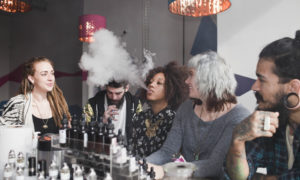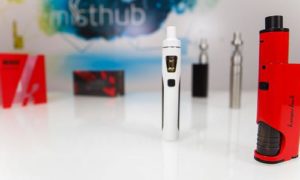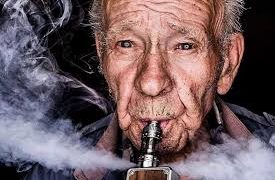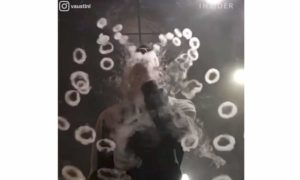When Indiana passed new regulations for the liquid used in a smoking alternative known as vaping, Brett McCullough spent more than $70,000 to make sure his company, Hoosier E-Cig, Inc., would comply with the law.
Now, he’s out of luck.
He says that’s because his company and dozens of e-liquid producers are being shut out of Indiana by a controversial state law that effectively makes a small security firm in Lafayette the vaping industry’s gatekeeper.
The impact, however, would extend well beyond producers. Retailers who must now find new sources for their product say the few producers who have been approved are charging much more. Ultimately, it is consumers who will have to pay higher prices, they say.
At issue are new regulations passed by state lawmakers in 2015 and revised earlier this year. The rules require any company that wants to produce e-liquid for sale in Indiana to be certified by a security firm by June 30.
The catch: So far only one security firm in the entire country qualifies to perform the work under the law – Lafayette-based Mulhaupt’s Inc. At this point, the company has approved only six producers, shutting out many existing competitors.
The law was billed as an effort to establish safety regulations for what had been a largely unregulated vaping industry. The law outlines specific conditions for manufacturing – that it occur in a clean room, for example – as well as requiring child-proof caps, detailed bottle labels and traceable batch numbers.on the products.
But now, critics are questioning why lawmakers would allow so few companies to dominate what had been a highly competitive market.
The lawmakers most closely associated with the legislation did not return phone calls from IndyStar. One legislator, Rep. Kevin Mahan, issued a written statement, emphasizing his desire to provide safety for everyone in the supply chain, including consumers.
Doug Mulhaupt defended his company’s role in the process, saying he didn’t know until very recently his security firm currently is the only one to meet all the requirements. The Indiana Alcohol and Tobacco Commission says a second security firm — Security Specialists — is under review for eligibility.
"There are people in this industry that are upset about everything and my name got attached, and that's unfortunate," Mulhaupt said. "We're a privately run company, and we get to decide who we do business with."
Mulhaupt said his company didn’t lobby for the legislation.
A primary force behind the legislation was Zak Laikin, the son of former Brightpoint CEO Bob Laikin. Zak Laikin and his Indiana Vapor Company hired a team of four high-powered lobbyists to advocate for the law.
“Indiana initially passed the law over 18 months ago. There has been ample time for anyone interested in the business to acquire any and all licenses,” Laikin said in an email. “Moving forward there are qualified companies ready and able to meet the needs of Indiana's market in a safe and secure way in accordance with the law.”
Laikin's Indiana Vapor company hasn’t received a permit to produce, but his newly created Vapor Association of Indiana is representing the few companies that have been approved.
Those companies will effectively dominate the industry because of another provision in the state law: No other companies can qualify to manufacture or sell e-liquid in Indiana if they haven’t been approved by the Alcohol and Tobacco Commission by the June 30 deadline.
"I've never quite seen anything like this," said Keith Broviak, director of marketing for Ricker's, a chain of 56 convenience stores that sells e-liquid and will now have few choices about where to get it. "No new businesses can ever come into play with this law because you can't get certified."
ATC Chairman David Cook said in a statement that an application is pending for a seventh manufacturer. Security for that company would be provided by Security Specialists, if it is determined to be an eligible provider
However, there are less than two weeks left for the security company to demonstrate that it meets the qualifications. Only after that could it accept vape manufacturing clients — a scenario that critics find unlikely.
Turned away
Mulhaupt’s has certified six companies and says it doesn’t plan to consider any others. Of those it has certified, at least two aren’t up and running yet.
Meanwhile, well-established e-liquid producers say Mulhaupt’s is turning them away with little or no explanation.
"We went through all the steps that we needed to be compliant with the law," McCullough said. "We did everything that the law requires, and then when we put in the application with the one security company, they said that they would not be our security company."
Jeff Piper, sales manager for C.B. Distributors, Inc., an e-liquid distributor based in Beloit, Wisconsin, said he had a similar experience.
"We started calling Mulhaupt's – our supplier did – back in March, and they have done nothing but put us off," Piper said. "I can tell you that my supplier offered them double their normal rates and they still refused to take us on as a client."
Mulhaupt said roughly 30 e-liquid companies had contacted his firm. He said Mulhaupt’s reviewed about 14 applications and chose as many as was manageable to sustain.
"We took the best six that we thought had the best chance of being successful under these new regulations. We turned some big guys down too," Mulhaupt said. "Size did not really matter to us. I don't get to decide the size of an industry."
Mulhaupt said four of his six clients are currently in production or will be in production within the week. The other two are waiting to see how new regulations from the Food and Drug Administration will impact their businesses before fully investing.
Those federal regulations, which don't take effect for two years, could have a chilling effect on the industry. The FDA has emphasized concerns about the increase in youths using e-cigarette products, and it fears that, for many, use of e-cigarettes eventually translates into traditional smoking.
Mulhaupt said he knows people in the industry are upset about the state law, but that he was working under a deadline himself, with only 60 or so days to conduct background checks, credit checks and business plan evaluations for each applicant.
He denied claims that Mulhaupt's left manufacturers without a response, saying the company issued letters with a specific date by which a company had to have their materials submitted to Mulhaupt's in order to be considered for a contract.
"I'm not the one that decides who is in this industry or not. I decide who I want to do business with," he said. "We spent a long time deciding whether this was even a business we wanted to be in."
Winners and losers
The forced shake-up of the previously unregulated industry is causing headaches for stores that sell e-liquid.
"It just kind of boggles my mind the way this has been set up," said Jay Ricker, owner of Ricker's Oil Company and Convenience Stores. "Basically the state has given their stewardship of making sure that we have the proper kind of products that we sell to the public, to another entity."
Ricker's sells a unique brand of “317” e-liquid at its 56 locations across central Indiana. But the manufacturer who currently produces the liquid was not able to get certification from Mulhaupt's. Now, two of the licensed producers are seeking Ricker’s business.
For Ricker's, e-liquid is just one product of many. But for companies specializing in e-liquid or independent vape shops, the complicated law and a deadline of June 30 mean massive industry changes and even an end to business.
“I’m not against regulation. I’m against my company getting put out of business by a monopoly,” said Evan McMahon, owner of e-liquid manufacturer Liberation Vape and chairman of Hoosier Vapers, an industry and consumer advocacy group.
“Instead of the normal Hoosier values of people starting their business and succeeding on their own, the state has now allowed a third party to pick the winners and losers,” McMahon said. “And if you’re not well connected, you’re a loser.”
His group is now part of two lawsuits challenging the law.
Vape users will also pay a price for the legislation, said Scot Imus, executive director of the Indiana Petroleum Marketers and Convenience Store Association, which represents the majority of the state’s roughly 3,000 convenience stores.
“It’s certainly going to impact supply and when that happens, cost is going to be exorbitant,” he said. “The handful of manufacturers who have been approved know they have a virtual monopoly throughout the state. I have not found one convenience store that is selling a product on the manufacturers list.”
Shrinking the field
The lawmakers closest to this bill have been largely silent about its impact on the free market.
Mahan, the Hartford City Republican who is listed as the author of the initial 2015 bill, declined an interview with IndyStar. Instead, his office sent the following statement:
“At the end of the day, safety is a huge factor when it comes to e-liquids. We want to make sure that everyone involved in the supply chain is safe, including the consumers, retail stores, manufacturers and their employees,” Mahan said. “I intend to continue to find ways to ensure e-liquids are a safe product for Hoosiers to use.”
Senate Public Policy Chairman Ron Alting, a Lafayette Republican who championed the security requirements, also declined to return phone calls from IndyStar.
He said earlier this year that there were other security firms that could meet the law’s requirements. But as of Friday, just two weeks before the deadline, the ATC said they are aware of only one qualifying security firm – Mulhaupt’s.
At least one lawmaker has had a rocky relationship with the legislation.
Republican Vaneta Becker of Evansville proposed a 2016 amendment to the bill that would loosen the requirements for qualifying security firms. Based on the original 2015 language, not a single security firm in the country qualified.
“I did it because I thought I was helping. Well, at least somebody will be able to meet this criteria,” Becker said. “Then the more I heard from people all over the state, it just didn’t sit with me.”
Becker said she ultimately pushed to have her own language stripped from the bill, claiming it would create a monopoly by establishing Mulhaupt’s as the only qualifying security firm.
“I just felt like they were moving too quickly, and I guess I didn’t know what was really behind it,” Becker said. “I just decided the more I heard about this and the more discussions I had, that I would rather nobody be eligible than to create a monopoly.”
Alting opposed stripping the language, Becker said, so the amendment stood.
Sen. Phil Boots, R-Crawfordsville, who proposed an amendment to the bill, did not respond to requests for comment. Sen. Carlin Yoder, R-Middlebury, listed as a sponsor on the original 2015 bill, also could not be reached. Rep. Thomas Dermody, a LaPorte Republican listed as the author of this year's bill, declined to comment.
What the future holds
The fate of the industry is still unclear, with two pending lawsuits challenging the new law.
McMahon, the law's leading opponent, is expecting a federal ruling at the end of June on the measure's constitutionality. He's also waiting on a state ruling on whether Indiana's law is preempted by new FDA regulations.
A ruling in McMahon's favor could mean, at minimum, a delay in the law's implementation; a ruling in favor of the new law would bring a significant reduction in the roster of Indiana's vaping companies.
IndyStar reporters Chelsea Schneider and Shari Rudavsky contributed to this report.
Call IndyStar reporter Tony Cook at (317) 444-6081. Follow him on Twitter: @indystartony.
Call IndyStar reporter Sara Salinas at (317) 444-6157. Follow her on Twitter:@saracsalinas.
What is vaping?
Vaping is an alternative to smoking that involves loading an electronic vapor pen with flavored liquid containing any combination of vegetable product, water and nicotine. Though vaping mimics the act of smoking traditional cigarettes, proponents claim it's healthier and often bill the technology as a tool for smokers to quit using cigarettes.
Approved manufacturers
So far six vape producers have secured contracts with the only security company currently identified as meeting the necessary requirements and have been approved by the ATC to manufacture e-liquid in the state:
Cloudtown of Cleves, Ohio
DB Vapes of Indianapolis
DNM Ventures of Fort Myers, Fla.
Licenses E-Liquid Manufacturer of Fort Wayne
VapeINg of Lafayette
Vapor Bank of Evansville
Click here to view original web page at www.indystar.com






















